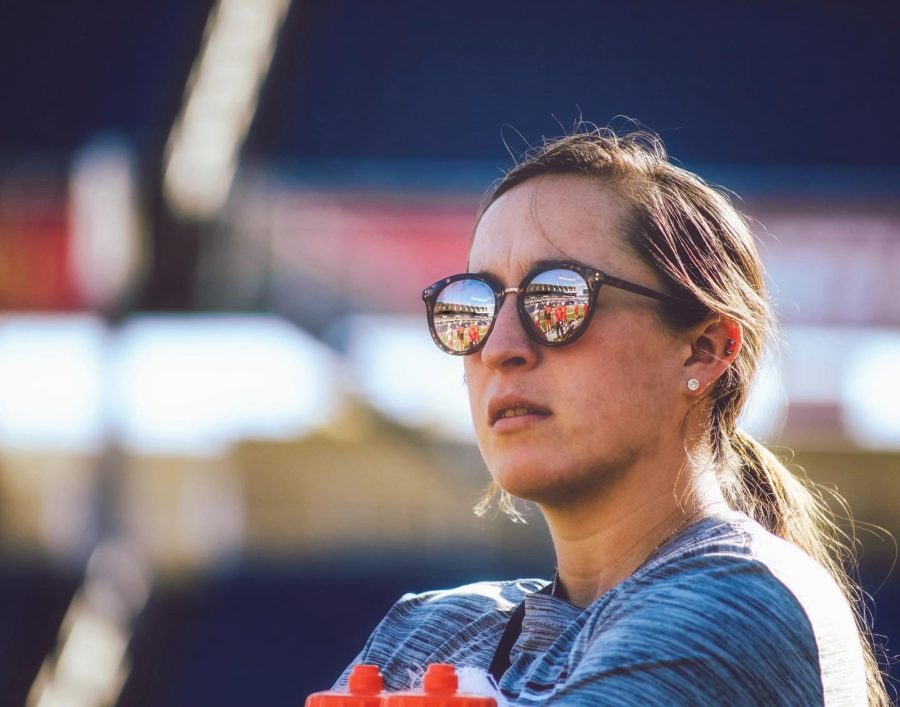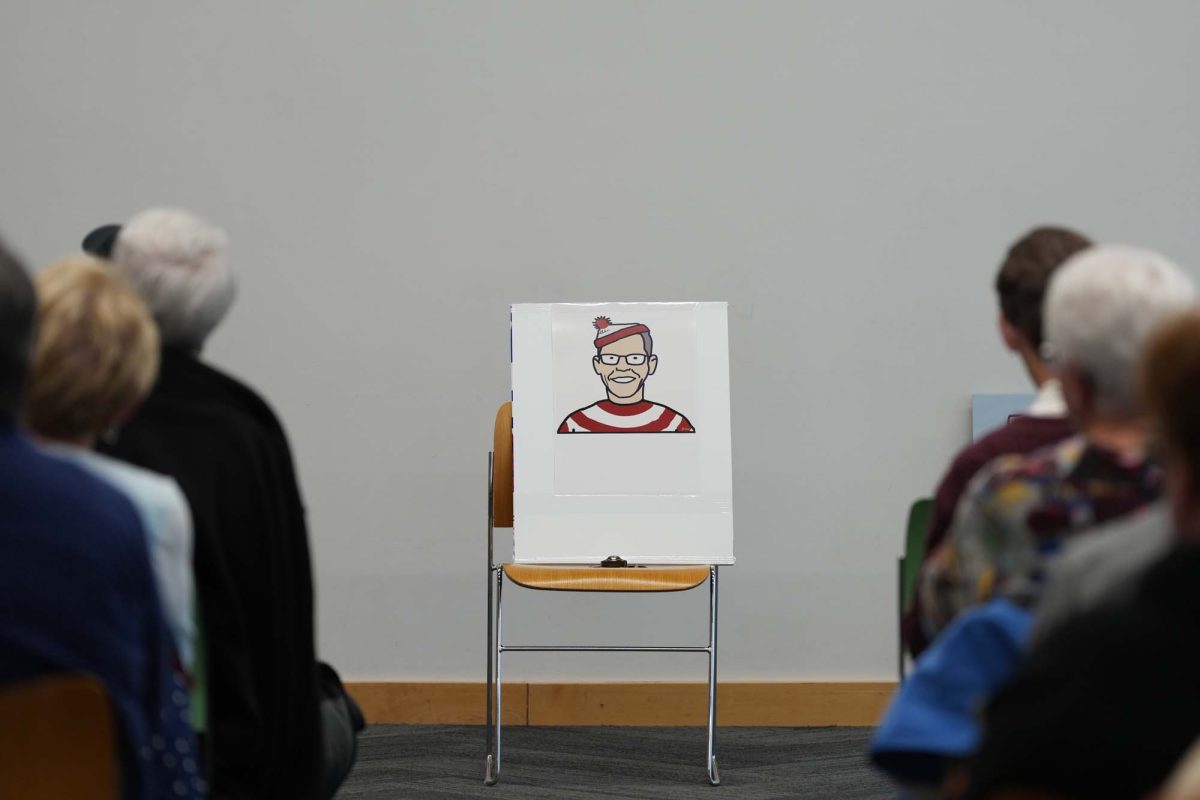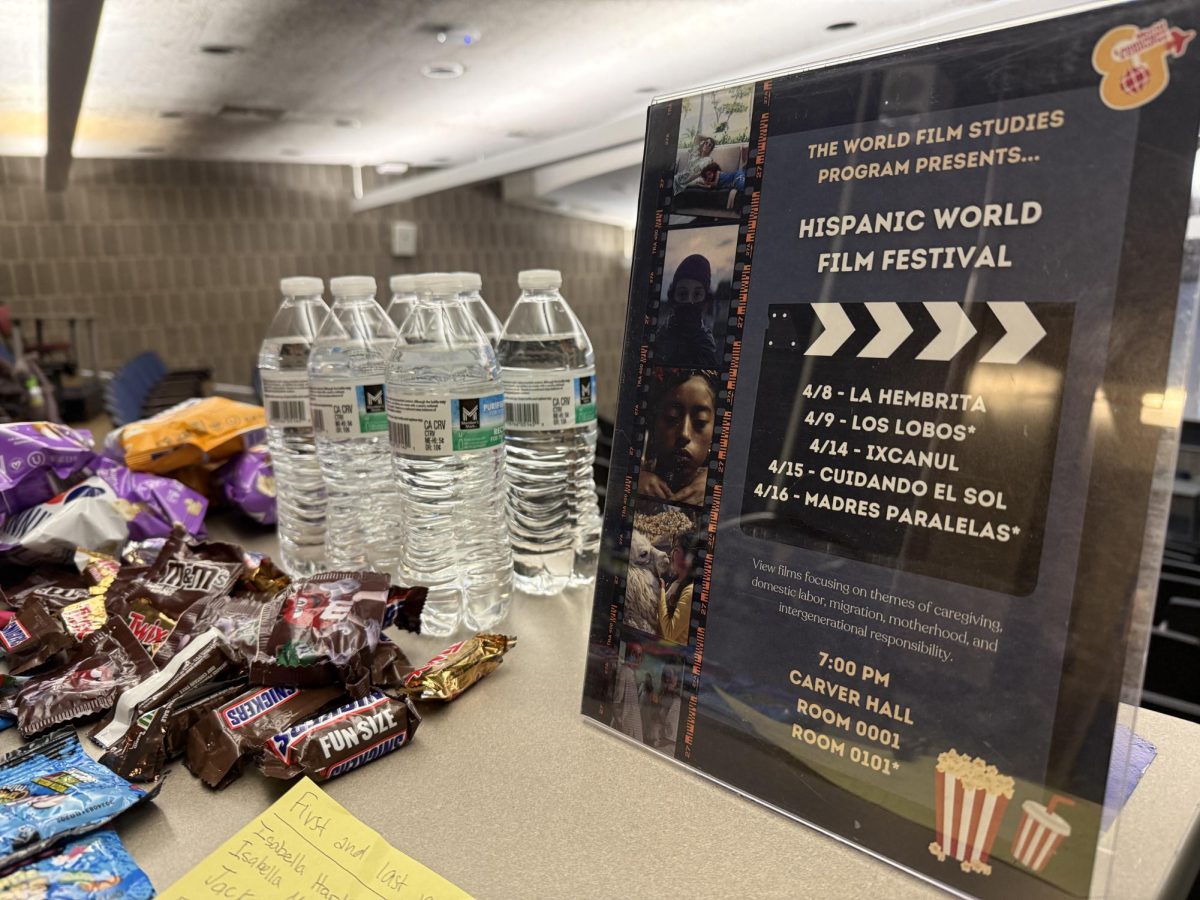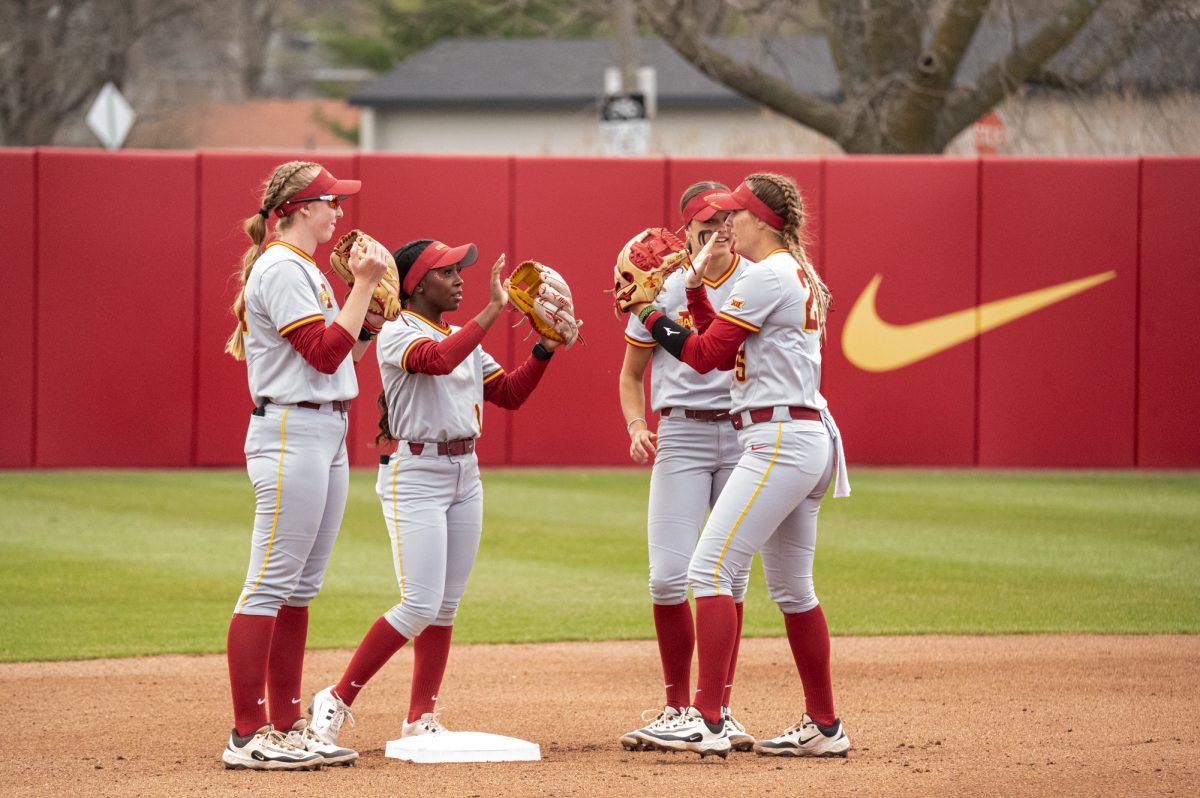Hidden Heroes: Rachel Voet
April 3, 2022
Rachel Voet walks the hallways of the Stark Performance Center like it’s her home. And in many respects, she views it like one.
Voet, Director of Sports Nutrition for Iowa State football, refers to her work relationship with Iowa State football players similar to that of ‘brother-sister.’ Players tend to call her ‘Coach Rachel.’
In the maze of doors and hallways in Iowa State Athletics’ $90 million facility, Voet knows where each one leads is greeted with smiles and warm exchanges by everyone she crosses paths with. This includes a pair of golden retrievers, who perch up to the window to say hello while helping keep the equipment staff in good spirits.
She’s a vital cog in the massive machine that is Iowa State football.
“She’s a total team player,” Iowa State associate athletic director of sports medicine Mark Coberley said.
Voet enters her third season in the program ready to continue making change and building relationships.
Personal Mission
Voet knows what it’s like to work for something you want. For most of her life, she’s had to grind and go the extra mile.
She went to an all-girls high school, competing in club volleyball along with track and field. She got along with her classmates, but the undertone of competitiveness on the field and in the classroom was always there.
“I have always been going above and beyond,” Voet said.
Growing up in Nebraska, sports surrounded her life for as long as she could remember. The Cornhuskers and Bluejays dominated the attention of her family and friends. It wasn’t hard to see herself in sports.
But she left the state and graduated from Iowa State University in 2017, completing a five-year BS/MS degree in diet and exercise. For her internship credit, Voet went back to her home state and worked as a dietetic intern at the University of Nebraska.
It was here that Voet’s ability to go the extra mile caught on with her colleagues. They noticed she’d be in at 5 a.m. and wouldn’t leave until 10 p.m. some nights.
“110 percent goes into her work,” said Lisa Lopecky, assistant director of performance nutrition at the University of Nebraska. “She’s willing to jump in wherever she’s needed.”
But before Nebraska, before Iowa State and her growth as a mentor, Voet needed a wake-up call to truly send her on the path she’s on now.
Voet experienced multiple injuries in high school. Due to a middle school basketball injury, Voet had hip surgery a year later after her freshman year of high school.
The need for surgery was caused by an osteochondroma bony growth in her hip. When she recovered from surgery, she turned to running as a way to condition herself for volleyball.
And that’s when years of an unstable and dangerous on-and-off relationship with food began.
“Obviously, I was running so much that I needed to eat more and fuel myself, and I think I kind of had a little bit of a skewed relationship with food,” Voet said. “That was kind of the time of ‘Biggest Loser’, the Super Size Me [documentary] and all of those, ‘Food is bad, food is harmful, this is junk.’ I think a lot of that, just the media at the time when I was in high school, was very negative from a fueling standpoint.”
Voet didn’t eat meat or dairy products for long periods of time and her typical lunch would consist of a small salad and crackers. From lunch, she’d head to her two-hour cross country practice.
Her stark realization came her senior year when she began to feel her performance declining and constant black-outs during races due to heat strokes. Voet doesn’t remember the last half mile of those races.
“It got to the point where there was one meet where I basically turned blue at the finish,” Voet said. “I had to go to the doctor to get my iron tested and everything, and it turned out I was anemic. I didn’t have my period, all of the things I know are pretty classical relative energy deficiency in sport.”
Relative energy deficiency in sport is defined as, ‘the result of insufficient caloric intake and/or excessive energy expenditure,’ according to the British Journal of Sports Medicine.
It changed Voet’s whole perception of food and how athletes at all levels perceive what they put in their bodies. Her consistent under-fueling changed her body and her outlook on what food can do to a person – good and bad.
“In hindsight, I wish I would have been able to help myself back then,” Voet said.
Sports nutrition wasn’t as valued as it is today.
One of the biggest examples comes as recently as 2014, with the NCAA’s so-called “one-bagel rule,” allowing student athletes one sanctioned meal per day from institutions.
Student athletes could have unlimited “fruits, nuts and bagels” throughout the day in place of a meal. The NCAA bylaw prohibited the use of spreads like cream cheese, jelly or peanut butter on bagels until the provision was removed in 2014, as those made the bagel another “meal.”
Voet said the differences today are clear: college athletics is finally realizing the importance of fueling athletes properly and safely.
“Once I was working with athletes, that’s where a lot of my philosophy with nutrition came from,” Voet said. “Everything in moderation. Food is meant to nourish you, there is no such thing as good food vs bad food, everything is going to provide some kind of nutrition to you as an athlete.”
“I kind of wanted to help other people not go through what I had to go through,” Voet said.
Building trust
Food can be a sensitive topic.
Without trust and a personal connection, Voet said athletes can be left in the dark and made to feel like any decision they make could spiral out of control.
“Food means so much to so many people,” Voet said. “It’s a cultural thing, it’s a nostalgic thing, it’s a mental thing, emotional thing. Especially for student athletes, they have enough stress with school and their sport, body image, social media. Food is either one of the things they’re going to hyper focus on and try to control or something they’re not going to care about and it won’t matter until it is what matters.”
Having graduated from Iowa State in 2017, Voet can relate to the football players, which is crucial for building relationships. Voet is a friend willing to guide them along their nutritional path rather than an instructor with a list of items to eat and not to eat.
Voet periodically goes to meals with the players to chat and see how they’re feeling.
“They aren’t all the same,” Voet said. “You have to work with them individually and figure out what can work for them and what they need to improve on.”
Before Voet came to Iowa State, she was setting herself apart at Nebraska with her work ethic and her natural ability to connect with people.
Kopecky worked with Voet for two years and watched her develop her confidence and willingness to go the extra mile. Kopecky noticed it. And so did Nebraska football players.
“You have to be personable and be willing to listen and make conversation,” Kopecky said. “You can’t be a wallflower. You have to be willing to learn about the particular athletes.”
College football players can be hard to crack at times.
Kopecky said many college football players come from across the country to an unfamiliar place. For a while, they’re closed-off as they try to find their footings. But, if they see you’re working to make them better and have clear methods and guidance, they’ll follow you. Kopecky said Voet understood that calling and took time to care for players and their questions.
If she hadn’t built that trust, it would have been difficult to get the level of buy-in players have now.
“Everything we do is based on trust,” Kopecky said. “Food is a sensitive subject for people, and it’s personal for everyone. Not everyone is willing to share.”
Voet helped with the implementation of the Life Skills Kitchen at Nebraska, which helps student athletes cook in a real kitchen with access to all kinds of flavor profiles.
When players move off campus and out of the program, the program prepares them not only to cook for themselves, but to trust themselves as their own nutrition expert.
When Voet left Nebraska for Iowa State, her spark to improve people and their experience wasn’t hard for Coberley and other Iowa State administrators to notice
They knew coming from Nebraska, Voet had the credentials to get the job. The question was whether she could connect with players and build a system of support.
It didn’t take long for an answer.
“Hiring Rachel was a game changer for us,” Iowa State Head Football Coach Matt Campbell said. “We have already seen the positive results of her work. Rachel and her staff are extremely respected by our student-athletes, our coaches, and we can trust that she is taking care of their needs.”
She works with a staff of 20 students, offering players a network of easy-going, helpful sources.
“It’s easy to see her personality,” Coberley said. “She’s got a knack for it. She’s not the nutrition police, but more like nutrition guidance. It’s easy to trust her.”







